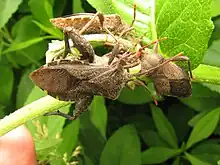Coreinae
Coreinae[2] is a subfamily in the hemipteran family Coreidae. They have been shown to be paraphyletic with respect to Meropachyinae.[3]
| Coreinae Temporal range: | |
|---|---|
 | |
| Male Amorbus rubiginosus (Amorbini) | |
| Scientific classification | |
| Domain: | Eukaryota |
| Kingdom: | Animalia |
| Phylum: | Arthropoda |
| Class: | Insecta |
| Order: | Hemiptera |
| Suborder: | Heteroptera |
| Family: | Coreidae |
| Subfamily: | Coreinae Leach, 1815[1] |
| Tribes | |
|
See text | |
Tribes

Mictis profana (Mictini)

Piezogaster sp. mating group (Nematopodini)
The following tribes belong to the Coreinae:[1]
- Acanthocephalini Stål, 1870 - Americas
- Acanthocerini Bergroth, 1913 - Americas
- Acanthocorini Amyot and Serville, 1843 - Africa, Asia, Australia
- Agriopocorini Miller, 1954 - Australia
- Amorbini Stål, 1873 - Australia, New Guinea
- Anhomoeini Hsiao, 1964 - Asian mainland:
- monotypic tribe: Anhomoeus Hsiao, 1963
- Anisoscelidini Laporte, 1832 - Americas, Africa, Europe, Asia
- Barreratalpini Brailovsky, 1988 - central America:
- monotypic tribe: Barreratalpa Brailovsky, 1988
- Chariesterini Stål, 1868 - mostly Americas
- Chelinideini Blatchley, 1926
- monotypic tribe: Chelinidea Uhler, 1863
- Cloresmini Stål, 1873 - SE Asia
- Colpurini Breddin, 1900 - Africa, Asia
- Coreini Leach, 1815 - Africa, Europe, Asia
- Cyllarini Stål, 1873 - tropical Africa, Sri Lanka
- Daladerini Stål, 1873 - Africa, Asia
- Dasynini Bergroth, 1913 - Africa, Asia, Australia
- Discogastrini Stål, 1868 - central and S. America
- Gonocerini (synonym Gonocérates Mulsant & Rey, 1870) - Africa, Europe, Asia, Australia
- Homoeocerini Amyot and Serville, 1843 - Africa, Asia
- Hypselonotini Bergroth, 1913 - Americas
- Latimbini Stål, 1873 - Africa
- Manocoreini Hsiao, 1964 - China
- monotypic tribe: Manocoreus Hsiao, 1964
- Mecocnemini Hsiao, 1964 - China
- monotypic tribe: Mecocnemis Hsiao, 1964
- Mictini Amyot and Serville, 1843 - Africa, Asia
- Nematopodini Amyot and Serville, 1843 - Americas
- Petascelini Stål, 1873 - Africa, Asia
- Phyllomorphini Mulsant and Rey, 1870 - Africa, mainland Europe, Asia
- Pephricus Amyot & Serville, 1843
- Phyllomorpha Laporte, 1833
- Tongorma Kirkaldy, 1900
- Placoscelini Stål, 1868 - central and S. America
- Prionotylini Puton, 1872 - Europe
- monotypic tribe: Prionotylus Fieber, 1860
- Procamptini Ahmad, 1964 - Philippines
- monotypic tribe: Procamptus Bergroth, 1925
- Sinotagini Hsiao, 1963 - China
- monotypic tribe: Sinotagus Kiritshenko, 1916
- Spartocerini Amyot and Serville, 1843 - Americas
Fossil genera
- Ferriantenna Cumming & Le Tirant, 2021 Burmese amber, Myanmar, Cenomanian[4]
- Magnusantenna Du & Chen in Du et al. 2021 Burmese amber, Myanmar, Cenomanian[5]
References
- "Coreinae". Integrated Taxonomic Information System.
- Coreoidea Species File (Version 5.0/5.0)
- Forthman, Michael; Miller, Christine W.; Kimball, Rebecca T. (2019). "Phylogenomic analysis suggests Coreidae and Alydidae (Hemiptera: Heteroptera) are not monophyletic". Zoologica Scripta. 48 (4): 520–534. doi:10.1111/zsc.12353. ISSN 1463-6409.
- Cumming, Royce T.; Tirant, Stephane Le (2021-06-14). "Drawing the Excalibur bug from the stone: adding credibility to the double-edged sword hypothesis of coreid evolution (Hemiptera, Coreidae)". ZooKeys (1043): 117–131. doi:10.3897/zookeys.1043.67730. ISSN 1313-2970. PMC 8217075. PMID 34163298.
- Du, Bao-Jie; Chen, Rui; Tao, Wen-Tao; Shi, Hong-Liang; Bu, Wen-Jun; Liu, Ye; Ma, Shuai; Ni, Meng-Ya; Kong, Fan-Li; Xiao, Jin-Hua; Huang, Da-Wei (2021-01-22). "A Cretaceous bug with exaggerated antennae might be a double-edged sword in evolution". iScience. 24 (1): 101932. doi:10.1016/j.isci.2020.101932. ISSN 2589-0042. PMC 7773949. PMID 33409478.
This article is issued from Wikipedia. The text is licensed under Creative Commons - Attribution - Sharealike. Additional terms may apply for the media files.